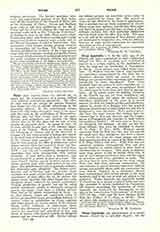

Vicar (Lat. vicarius, from vice, instead of), in canon law, the representative of a person clothed with ordinary ecclesiastical jurisdiction. The office of vicar was in use among the ancient Romans, that being the title of officials subordinate to the pratorian prefects. In the ecclesiastical forum, from very early times, we read of vicars of the Apostolic See, such as the archbishops of Thessalonica. Bishops also had their vicars, such as the archdeacons and archpriests, and likewise the rural priests, who, in the first ages, had the cure of souls outside of episcopal cities. In course of time, all of these officials became part of the ordinary magistracy of the Church. These vicars are treated in the Decretum of Gratian and in the Decretals of Gregory IX, but vicars-general of bishops first appear in the sixth book of Decretals and in the Clementines of the “Corpus juris canonici”. After the institution of vicars-general, the office of archdeacon ceased almost entirely when the Council of Trent had limited the powers of such officials. That council (Sess. XXV, c. xvi, “De ref.”) completely abrogated other vicarships that were incompatible with clerical discipline. A vicar differs from a vicegerent, who is constituted by a prelate in place of a vicar. The vicar himself without special faculties cannot substitute another vicar with equal powers in his own place. The jurisdiction of vicars is generally ordinary, but sometimes only delegated. The former archdeacons and archpriests and the present vicars capitular and some others have ordinary power in consequence of their office, but by the present discipline vicars Apostolic and vicars forane have only delegated power conferred by special commission. Vicarial jurisdiction in general can not be called merely mandatory (which is ultimately delegated power), for many vicars have a tribunal distinct from that of the prelate represented by them. As to their powers: vicars are constituted either in divinis, as parochial vicars and auxiliary bishops, or created vicars in jurisdiction, as vicars capitular and vicars general, to exercise power in the external forum, either voluntary or contentious. Some writers also distinguish vicars a lege, or those whose powers are perpetual and prescribed in law, and vicars ab homine, who depend entirely on delegated powers and are removable at will. Neither bishops nor inferior prelates can constitute vicars except in cases permitted by canon law. The powers of vicars are not affected by the mode of appointment, that is whether they are freely nominated or elected. When vicars have ordinary jurisdiction, their rights and duties in general are the same as those of other ordinary prelates, but their particular obligations must be learnt from the office they hold. The same is to be said of the cessation of their powers, which are terminated by resignation, etc., with the addition, however, of some special regulations for particular vicarships, as that of vicar-general.
WILLIAM H. W. FANNING

